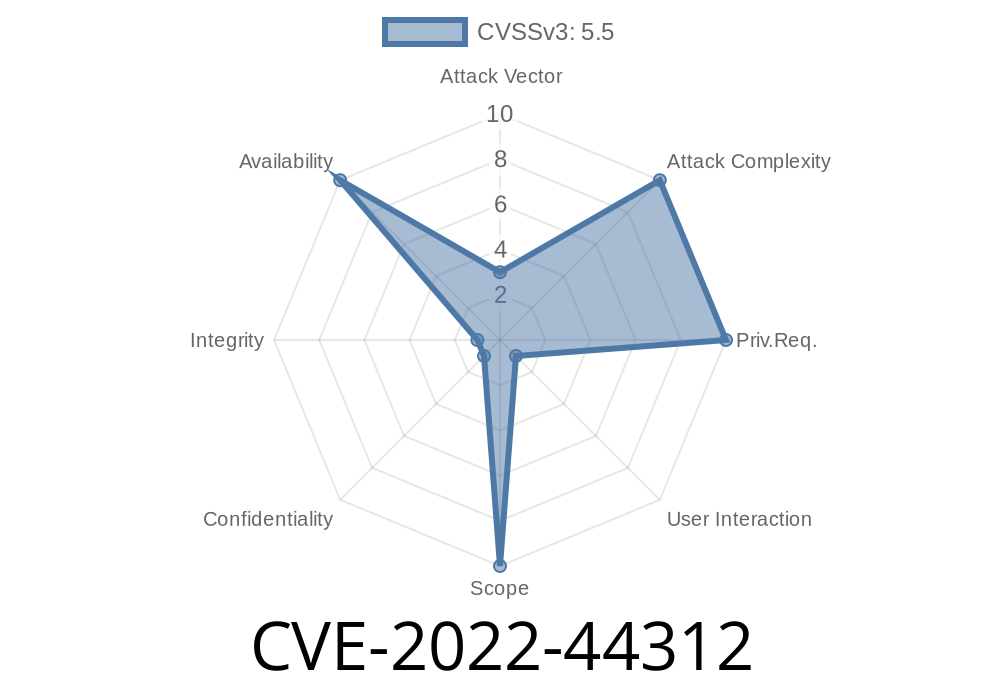A critical heap buffer overflow vulnerability has been identified in PicoC Version 3.2.2 and assigned the CVE identifier CVE-2022-44312. This vulnerability is caused by the improper handling of user input in the ExpressionCoerceInteger function when called from the ExpressionInfixOperator. Cybersecurity researchers have found that an attacker could exploit this vulnerability to execute arbitrary code on the target system and potentially gain control over the affected devices. This blog post will discuss the exploit details, share code snippets, and provide links to the original references.
Vulnerability Details
PicoC is a popular and lightweight C interpreter designed for scripting and embedded applications. The vulnerability in question lies within the ExpressionCoerceInteger function in the expression.c file, which is responsible for managing integer coercions during the execution of a PicoC script.
The heap buffer overflow can be triggered when the ExpressionCoerceInteger function is called from ExpressionInfixOperator with specially crafted input. As a result, the interpreter can be tricked into writing arbitrary data beyond the allocated buffer, leading to memory corruption and potentially resulting in the execution of malicious code.
Here is a code snippet from the vulnerable function in expression.c
void ExpressionCoerceInteger(struct Expression *Expr)
{
if (Expr->TypeOfValue->Base == TypePointer)
{
Expr->TypeOfValue = &IntType;
Expr->Val->Integer = (unsigned long)Expr->Val->Pointer;
}
}
The above function converts a pointer value to an integer without properly validating the input, resulting in a heap buffer overflow.
Exploit Details
To execute an exploit using this vulnerability, an attacker would need to create a malicious PicoC script containing specially crafted input that, when interpreted, triggers the heap buffer overflow in the target system. Because PicoC is often used in embedded systems, successful exploitation could result in control of critical infrastructure or business systems.
It is important to note that there is currently no known public exploit for CVE-2022-44312, but that does not mean it isn't a severe threat. Attackers with knowledge of this vulnerability could still create and deploy an exploit without relying on public exploits.
Mitigation
As of now, the PicoC development team has not released any official patches or updates for the affected version (3.2.2). Users are advised to monitor the PicoC GitHub repository (https://github.com/wlgq2/uthash) for any changes and apply patches as soon as they become available. Additionally, it is recommended to consider alternative scripting languages or, if possible, restrict the execution of untrusted PicoC scripts.
Conclusion
CVE-2022-44312 has the potential to impact numerous devices and systems that rely on PicoC as their scripting interpreter, especially in the realm of embedded systems. It is crucial for developers and sysadmins to be aware of this vulnerability and employ mitigation strategies to minimize the associated risks.
For more information and original references about this vulnerability, refer to the following resources:
1. PicoC GitHub Repository: https://github.com/zsaleeba/picoc
2. CVE-2022-44312 NIST NVD Entry: https://nvd.nist.gov/vuln/detail/CVE-2022-44312
3. Mitre CVE Entry: https://cve.mitre.org/cgi-bin/cvename.cgi?name=CVE-2022-44312
Timeline
Published on: 11/08/2022 15:15:00 UTC
Last modified on: 11/08/2022 21:55:00 UTC
